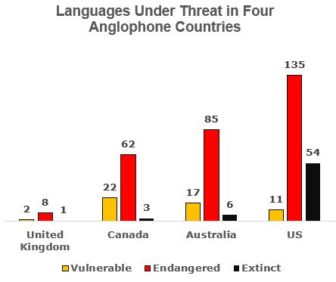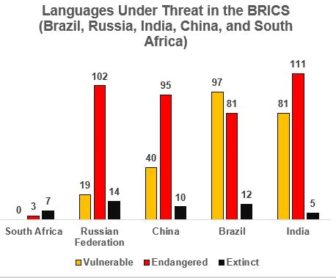MIAMI (TWH) – Some of the languages of our ancestors have become extinct and efforts are underway to save minority languages still in existence. Many of those languages often have ties to folk practices. It is useful to think of languages as resources that encode, preserve, and transmit cultures. Beliefs about the cosmos become part of the structure and words of a language. Concepts like Awen, Arete, the Dao, Yin-Yang, Chi, Prana, and Chakra among others have influenced many of our renewed Pagan cultures. As with other resources, some languages are under threat and there exist many efforts to protect and revive them.
How threatened are languages?
According to UNESCO about 43% of the world’s 6,000 languages are under threat. Melanesia, sub-Saharan Africa, and South America have the largest number of languages under threat. In the US, all 200 threatened or extinct languages appear to be Native American.

Source: UNESCO Atlas of the World’s Languages in Danger.
When someone ceases to speak a language under threat, they do not become mute. They begin to speak another language, generally one with benefits of money, status, or power. This change roughly parallels the path of empire. The languages of powerful nations tend to displace languages of nations with less power.
The process of language displacement occurs slowly. First, fewer people start to speak the language. Second, fewer young people learn the language, Third, fewer people speak the language in pubic. Slowly, it becomes a private home language. A vicious circle emerges in which the language has less and less relevance until it finally disappears.
UNESCO argues that countries have to require “national policies that recognize and protect minority languages” to save a language under threat. Social policies have to promote its use. That language has to be taught to young children.

Source: UNESCO Atlas of the World’s Languages in Danger.
Robert N. Kvašňák, Ed.D., discussed the impact of the internet on languages under threat. In a diaspora, people leave, flee, or are expelled from their home country. Scattered across the globe, people in a diaspora lack others with whom to speak their language. Their language competency slowly withers away.
The internet allows people in a diaspora to speak across vast distances. This virtual community allows languages to live in new contexts, frequently urban. As this speech occurs on the internet, the language under threat develops new words for new technology. This potential for growth never occurred in prior diasporas.
Kvašňák noted an “explosion of sites offering courses in Gaelic, Maori, Hawaiian, and Esperanto.” Kvašňák said that Esperanto “is gaining approximately 200,000 to 300,000 new speakers a year.”
Two US states are trying to preserve Native languages
Under the Language Preservation Pilot Program, Montana provides some funding for Native American language programs in public schools. These programs teach in Native languages for at least half the school day. Only one other state, Hawaii, funds Native language immersion programs. Hawaii has only one native language. Montana has nine. The Montana Language Preservation Pilot Program may end this year.
Efforts to revive the Hawaiian language
After the US annexed Hawaii, the US actively discouraged the use of Hawaiian language. Kvašňák noted seven problems facing the revival of the Hawaiian language. He said these problems are common to most endangered languages.
- Text books in the language do not exist.
- The language has little prestige at home and almost none abroad.
- Using more than one language in business and government costs more than using one language.
- Families that maintain a native language often have little formal education. They know a great deal about the world around them, usually a rural one. People in the rest of the world know little about their world.
- Knowing a native language yields no economic benefit in other, more powerful language communities.
- The languages under threat have often not unified their dialects.
- Generally higher education does not occur in languages under threat, but mainly in dominant languages.
Language revival in Europe
Many people think of colonialism as something Europe did to the rest of the world. Intra-European empires did exist. They, however, differed somewhat from extra-European empires. Still, intra-European empires have threatened Basque, Breton, Cornish, Gaelic, Romani, Saami, and Yiddish, among other European minority languages.
Kvašňák discussed efforts to resurrect Cornish, a Celtic language. The UN had declared it extinct, but some parents decided to make Cornish their “home” language. They began to teach their children Cornish. UNESCO now labels it as “critically endangered,” but “revitalized.” That label spurred even more interest in the Cornish language.
Bitesize Irish teaches Irish Gaelic online. They organize immersive weekends and conversation group around the world.
Gaelic USA promotes the study of Scottish Gaelic culture, including its language. They have set up a Scottish Gaelic Twitter handle #IsMiseGàidhlig. They also have an inclusive and welcoming statement about Scottish culture and identity.
Central and South America
In Latin America, the size of the Native population largely determines linguistic survival. Kvašňák reported that in Mexico and Peru, “There is growing interest in maintaining the different Native languages alongside the imposed Spanish of the conquistadores.” In areas with smaller number of indigenous people, the outlook is much worse.
Languages as social resources provide a wealth of knowledge about how the speakers of those languages understand the world. Very few, if any, see the world as a market to exploit for profit. Many see the world as alive, relational, and spiritual. Contemporary Pagans could learn a great deal from many of the languages under threat.
To explore languages under threat by country, the interactive UNESCO Atlas of the World’s Languages in Danger is an excellent resource.
The Wild Hunt is not responsible for links to external content.
To join a conversation on this post:
Visit our The Wild Hunt subreddit! Point your favorite browser to https://www.reddit.com/r/The_Wild_Hunt_News/, then click “JOIN”. Make sure to click the bell, too, to be notified of new articles posted to our subreddit.